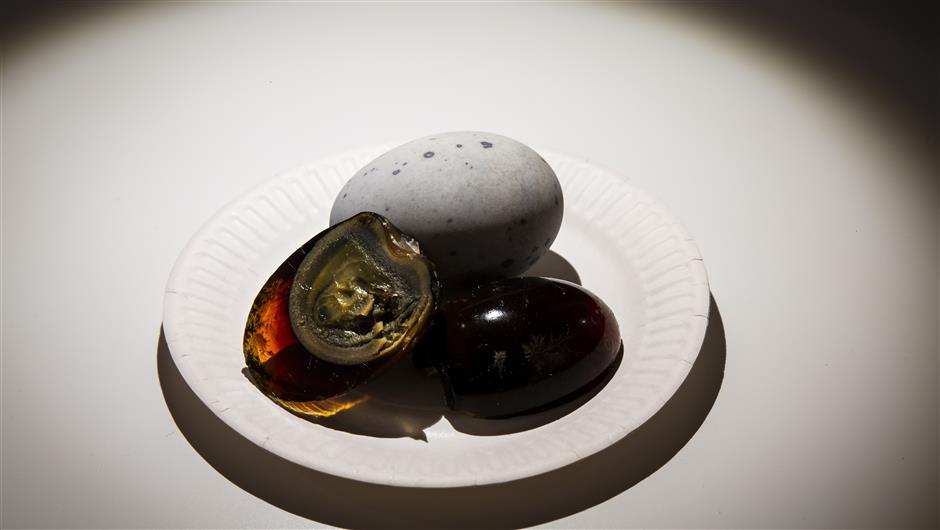Black eggs: disgusting or delicious delicacy?

Early this summer, the Disgusting Food Museum, a traveling exhibition from Sweden, made its Asia debut in Chinese Taipei, showcasing over 80 global delicacies often deemed revolting. Among them were two familiar staples of Chinese cuisine: stinky tofu and the century egg.
Known in Mandarin as pidan (皮蛋), the century egg is made by preserving duck eggs in a mix of alkaline clay, lime and rice husks for several weeks. The result: a translucent, amber-brown "white" and a creamy, dark yolk with a flavor prized by many, and reviled by others. The Cihai, China's encyclopedic dictionary, aptly calls it "tender and tasty."
But to Western audiences, it's often misunderstood. In 2011, CNN controversially ranked the century egg as the "most revolting food" on the planet. The backlash from Chinese readers was swift and strong, prompting an editorial response and a public apology. Since then, century eggs have repeatedly appeared on "most disgusting foods" lists in the Western press.
Of course, disgust is rarely objective. One man's meat is another man's poison. What one culture calls a delicacy, another might consider intolerable. Cheese – molded, fermented and often pungent – might be a good Western analogy. The Disgusting Food Museum, to its credit, acknowledges this, framing revulsion as a cultural construct. Still, its inclusion of Chinese foods often risks reinforcing old stereotypes, especially when viewed through a Eurocentric lens.
Century eggs go by many names in English: century egg, thousand-year egg, black egg, preserved egg, and simply pidan. But names matter. Terms like century egg and thousand-year egg, while evocative, border on the grotesque and mythical. For international audiences, neutral descriptors like black egg, preserved egg, or the transliteration pidan may better serve cross-cultural understanding.
Next, the way we introduce black eggs also matters. Like cured meats or fine wine, black eggs require time to prepare and mature. The challenge for many people lies in their smell and appearance. But let's not forget that cheese, a familiar European delicacy, comes in a variety of strong-smelling and uniquely textured forms. Black eggs, too, could be framed in a similar light.
By emphasizing the rich, complex flavors of black eggs, comparing them to fine cheeses, and pairing them with the visual appeal of gemstones like black diamonds or emeralds, we can reshape their image. With the right narrative, beautiful visuals and celebrity endorsements, the negative reputation of black eggs may eventually fade.
Finally, mindset is the key. Food preferences are highly subjective. We should agree to disagree. In a world as vast as ours, it's essential to embrace diversity while fostering mutual respect. To accept differences without demonizing them is the true path to harmony. Confucius said, "Is he not a man of complete virtue, who feels no discomposure though men may take no note of him?" A true gentleman doesn't get annoyed when others know little about him.
Interestingly, pidan just cracked open the American market in early July when these Chinese black eggs flew off the shelves at Costco stores across the United States. While black eggs have quietly sat on the shelves of Asian supermarkets for years, this marks their first widespread success in a major US retail chain. They're now enjoying a surprise moment in the American mainstream.
So, is the black egg disgusting? That depends entirely on your frame of reference. In today's globalized world, it may be time to replace reflexive revulsion with curiosity – and maybe even take a bite.
(The author is a professor of English and dean of the School of Foreign Languages at Sanda University, Shanghai)
In Case You Missed It...



![[Weekend Escape] 48 Hours in the Cyberpunk Capital – Chongqing](https://obj.shine.cn/files/2026/01/28/6cbf1ef4-2e20-44f5-b457-caa8878c9ebc_0.jpg)


